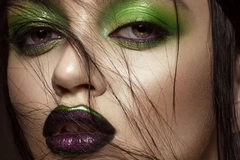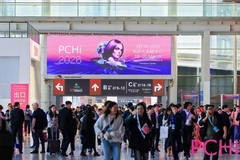South Korea’s cosmetic industry ranks third globally as exports reach US$10B milestone

South Korea’s Ministry of Food and Drug Safety has become the third-largest cosmetics exporter after exceeding US$10.28 billion last year, up 20.3% from the previous year. K-beauty has a growing influence on the global personal care industry, offering solutions that key into major trends such as multifunctional and eco-conscious products.
This export surge underscores the nation’s current position as the third-largest exporter of cosmetics in the world, behind France, which exported US$23.26 billion, and the US, which exported US$11.2 billion. Korea has overtaken Germany, which recorded US$9.08 billion in exports during the same period.
South Korean exports of cosmetics to other key market regions across Europe, Asia, and North America have also increased. The government agency claims K-beauty products were exported to 172 countries last year, up from 165 in 2023.

The United Arab Emirates (UAE), Indonesia, and Poland stand out among emerging export markets, highlighting the category’s broad appeal across diverse international audiences.
China remains the largest importer of South Korean cosmetics, amounting to US$2.49 billion in 2024, followed by the US and Japan.
Over the past decade, South Korea has emerged as a leader in beauty, shaping international trends through innovation and strategic use of social media to amplify K-beauty product visibility. Spate reported that “Korean skin care” recorded a 119.8% surge in popularity as a search term.
Domestic production
Domestic production in Korea is skyrocketing to keep up with global demand. The production is led by skin care and color cosmetics.
In 2024, the total amount of cosmetics produced reached ₩17.54 trillion (US$12.8 billion), up 20.9% year-on-year. Skin care, however, remains the largest category, accounting for 58.7% of the total, equalling ₩10.3 trillion (US$7.5 billion).
 South Korea now ranks third globally in cosmetic exports, as overseas demand exceeds US$10.28 billion. Lipsticks and lip gloss are driving the uplift in sales of color cosmetics, with output rising 51.4% to ₩2.68 trillion (US$1.94 billion). These account for 15.3% of total production.
South Korea now ranks third globally in cosmetic exports, as overseas demand exceeds US$10.28 billion. Lipsticks and lip gloss are driving the uplift in sales of color cosmetics, with output rising 51.4% to ₩2.68 trillion (US$1.94 billion). These account for 15.3% of total production.
Seoul to the States
Korea recently overtook France as the top exporter of beauty products to America. Shipments reached a record high of US$10.2 billion in 2024, an increase from 2020’s US$7.5 billion.
However, there are ongoing concerns over the US’s tariffs, which, if implemented, could affect the import of Korean beauty products into the US.
After the 90-day pause, South Korea may face a 25% tariff, which could increase product prices for American customers.
Brooklyn-based skin care store Senti Senti, which primarily stocks beauty products imported from South Korea and Japan, has already witnessed the impact of the Trump tariffs, with customers “panic-buying” to avoid inflated prices.
Trade talks
The two countries have engaged in talks since Trump announced the “Liberation Day” tariffs in April. The US has asked South Korea, which currently enjoys an FTA (Free Trade Agreement), to resolve the “trade imbalance” in commodities between the countries.
Data reveals that in 2024, the US recorded a US$66 billion trade deficit with South Korea, an increase of nearly 30% compared to the previous year, according to the US Trade Representative (USTR).
Both parties have reportedly discussed tariff and non-tariff measures flagged in the USTR’s 2025 National Trade Estimate Report on Foreign Trade Barriers.
Diverging claims between the two countries continue to challenge trade negotiations. Trump claims South Korea charges a 50% tariff on American goods. However, they disagree, saying the average tariff on US imports is under 1%, as the FTA requires. South Korea hopes to solidify its position in the beauty sector despite imposing US tariffs.
South Korea hopes to solidify its position in the beauty sector despite imposing US tariffs.
The International Monetary Fund lowered its prediction for South Korea’s economic growth to 1% after the US announced new tariffs. An agreement between the two countries is yet to be reached.
Industry power moves
In a move to promote Korean cosmetics internationally and future-proof the sector, South Korea has implemented strategies that include investment and regulatory measures.
The country’s Ministry of Food and Drug Safety has announced that it will celebrate Cosmetics Day every year on September 7. The government agency created the day following revisions to the Cosmetics Act enacted in April.
“We will work to ensure high-quality Korean cosmetics can access global markets more smoothly,” the ministry says.
The amendments reflect South Korea’s commitment to refining its cosmetic regulations, ensuring product safety and transparency. They include revised standards on ingredient usage, the removal of baseless natural and organic certifications, and the enhancement of labeling accessibility.
Additionally, South Korea has tightened regulations on indiscriminate false advertising of online products. These include “hospital exclusive” or misrepresented pharmaceutical efficacy claims linked to general cosmetics.
Revised guidelines for the Cosmetic Labeling and Advertising Management aim to enhance consumer protection as social media marketing expands.
 K-beauty has grown significantly over the past years.Meanwhile, as the country braces for the potential impact of US tariffs, it has launched a US$27 million fund to support beauty start-ups.
K-beauty has grown significantly over the past years.Meanwhile, as the country braces for the potential impact of US tariffs, it has launched a US$27 million fund to support beauty start-ups.
K-Beauty global takeover
Personal Care Insights has been following the rapid growth and consumer interest surrounding K-beauty trends in recent years, which have been reported to be vastly driven by social media trends. Searches with the hashtag #kbeautymakeup were up 85% year-over-year on TikTok.
In its beauty trend predictions for 2025, Spate said K-beauty would continue to influence skin care and makeup trends in the international beauty space, primarily driven by Gen Z and Millennial consumers who are more likely to prioritize multi-functional solutions, natural ingredients, and results-oriented formulations alongside affordability.
Recently, science-backed K-beauty hair loss brand Grabity debuted on the European market. Developed by researchers from the MIT School of Science in the US, the brand merges advanced biotechnology with the popular appeal of K-beauty, signaling a new phase of expansion in the hair care category.
“The Paris expo showed us that Korean innovation truly resonates with European consumers,” says Haeshin Lee, CEO at Grabity and a professor at the Korea Advanced Institute of Science and Technology.













